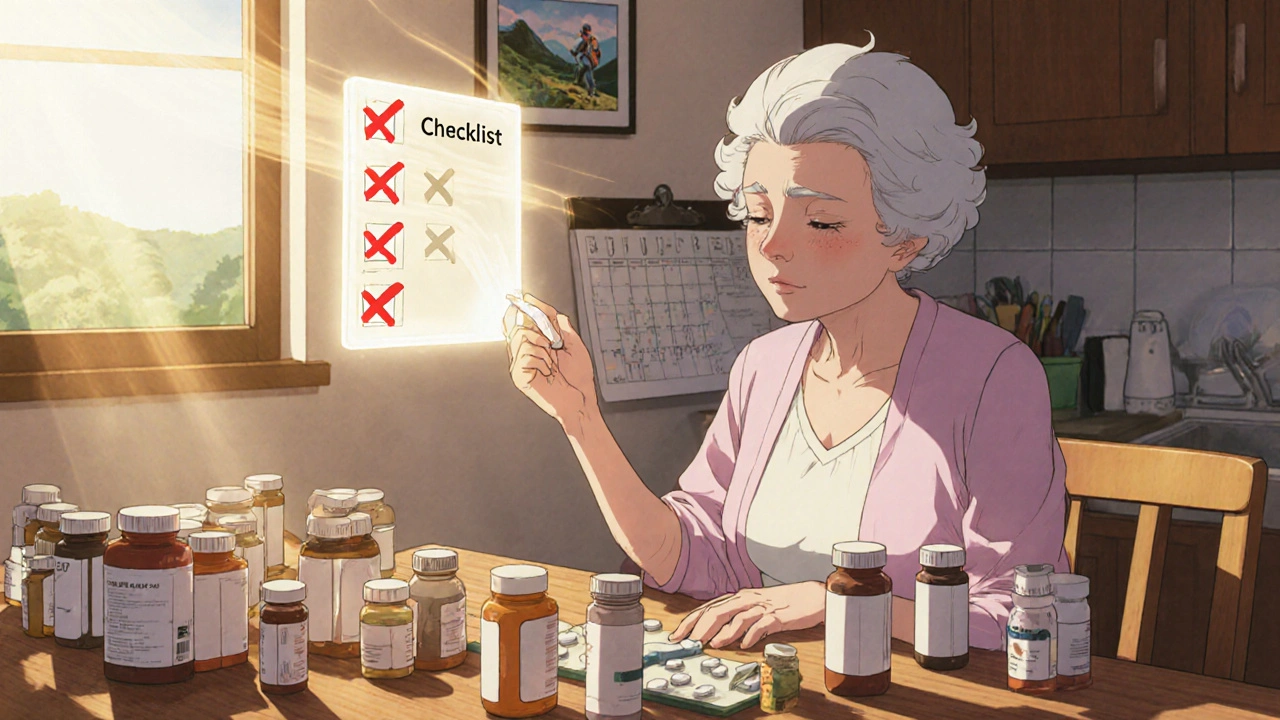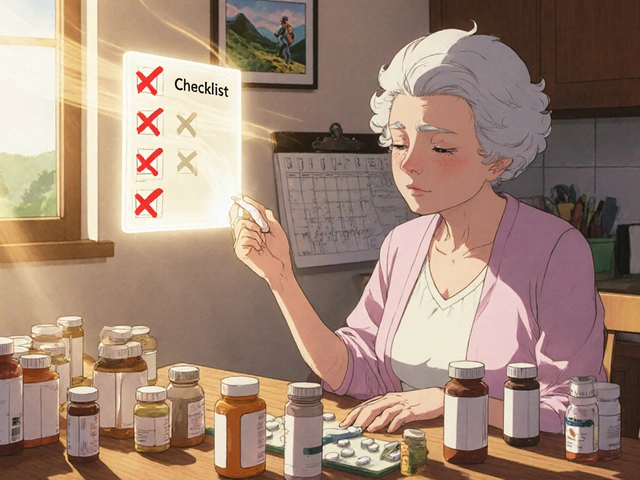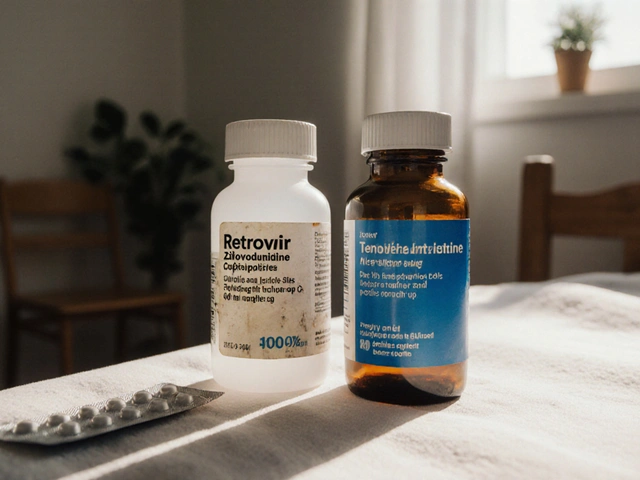Why So Many Seniors Are Taking Too Many Pills
It’s not unusual for a 75-year-old to take six, eight, or even twelve different medications. Some are for blood pressure, others for cholesterol, arthritis, diabetes, acid reflux, sleep, or anxiety. Over time, prescriptions stack up-each one added for a specific reason, but few ever reviewed for whether they still make sense. This isn’t just common-it’s dangerous. In the U.S., nearly half of all adults over 65 take five or more medications daily. That’s a 200% increase since the 1990s. And while these drugs may have helped once, many are no longer needed-or worse, they’re causing more harm than good.
What Is Deprescribing? It’s Not Just Stopping Pills
Deprescribing isn’t about cutting meds randomly. It’s a careful, planned process of reducing or stopping medicines when the risks outweigh the benefits. The term was first defined in 2003 by Australian doctor Michael Woodward, and since then, it’s become a core part of safe geriatric care. The goal? To match treatment with what matters most to the patient: comfort, independence, and quality of life-not just ticking boxes on a checklist of chronic conditions.
Think of it this way: when a doctor prescribes a new drug, they don’t expect it to last forever. They monitor how it works, adjust the dose, or stop it if side effects show up. But when it comes to stopping meds, the same care rarely happens. Many seniors keep taking pills for years simply because no one ever asked if they still needed them.
When It’s Time to Review-Four Clear Signs
Not every senior needs a full medication review. But if any of these four situations apply, it’s time to talk to a doctor or pharmacist:
- New symptoms show up-dizziness, confusion, falls, stomach pain, or fatigue that started after a new drug was added. These aren’t just "getting older." They’re red flags for drug side effects. One study found that nearly 30% of hospital admissions in seniors were caused by adverse drug reactions.
- Life goals have changed-if someone has advanced dementia, heart failure, or is no longer able to live independently, the focus should shift from preventing future disease to feeling better now. Taking a statin to lower cholesterol over 10 years doesn’t help someone with a life expectancy of 12 months.
- High-risk drugs are still in use-medications like benzodiazepines (for sleep or anxiety), anticholinergics (for overactive bladder), or long-term proton pump inhibitors (PPIs) for heartburn carry serious risks in older adults. The Beers Criteria, updated regularly by the American Geriatrics Society, lists these as potentially inappropriate for seniors.
- Preventive meds have no clear benefit-if someone is 85 with no history of heart disease, do they still need aspirin daily? What about a cholesterol-lowering drug if their life expectancy is under five years? These are questions worth asking.
The Tools Doctors Use to Decide What to Stop
Doctors don’t guess when it’s time to deprescribe. They use proven tools:
- Beers Criteria-a list of medications that are risky for seniors, updated every few years. It includes drugs like diphenhydramine (Benadryl) for sleep, which can cause confusion and falls.
- STOPP Criteria-this stands for Screening Tool of Older Persons’ Potentially Inappropriate Prescriptions. It looks at drug interactions and inappropriate combinations, like taking two drugs that both slow heart rate.
- Medication reviews by pharmacists-clinical pharmacists who specialize in geriatrics can spot problems doctors miss. A 2023 study showed pharmacist-led reviews reduced inappropriate meds by up to 40% in community-dwelling seniors.
- Electronic health record alerts-some clinics now use software that flags when a senior is on a high-risk combination or has been on a drug longer than recommended.
These aren’t just checklists. They’re decision aids. And the best ones come with patient-friendly guides-like those on deprescribing.org-that explain why a drug might be stopped and what to watch for afterward.
What Happens When You Stop a Drug? (And What to Watch For)
Stopping a medication doesn’t mean symptoms will magically disappear. Some side effects fade quickly. Others take weeks. And sometimes, the original condition comes back.
That’s why you never stop multiple drugs at once. One at a time. And always under supervision.
For example:
- Stopping a PPI (like omeprazole) for heartburn? Some people get rebound acid, which feels worse at first. But within 4-6 weeks, the body adjusts-and many find they don’t need it anymore.
- Stopping a sleep aid like zolpidem? Insomnia may return, but so can natural sleep patterns. Cognitive behavioral therapy for insomnia (CBT-I) is a safer long-term fix.
- Stopping a blood pressure pill? Blood pressure might rise slightly, but if the person is frail and the pill was causing dizziness and falls, a lower dose-or none at all-might be better.
Patients and caregivers should be told: "If you feel worse after stopping, call your doctor. But don’t restart it without talking first." Withdrawal symptoms are real, but they’re often temporary. And they’re far safer than long-term side effects.
Why Most Doctors Don’t Talk About Stopping Medications
It’s not that doctors don’t care. It’s that they’re rarely trained to do it. Medical school teaches you how to diagnose and prescribe. Few courses cover how to stop.
Guidelines focus on starting treatments-like taking statins, blood thinners, or diabetes drugs. But when to stop? That’s left out. A 2019 study in American Family Physician found that only 1 in 10 guidelines even mention deprescribing.
Plus, there’s fear. Fear of backlash from patients who think, "If this pill was good enough last year, why not now?" Fear of missing something. Fear that stopping a drug will make things worse.
But the evidence says otherwise. Studies show that when deprescribing is done right:
- Adverse drug events drop by 17-30%
- Hospital readmissions fall by 12-25%
- Seniors report better sleep, less confusion, and more energy
- There’s no increase in deaths or disease flare-ups
It’s not about removing care. It’s about removing unnecessary burden.
What Seniors and Families Can Do Right Now
You don’t need to wait for a doctor to bring it up. Here’s what you can do:
- Bring your full medication list-include vitamins, supplements, and over-the-counter drugs. Write them down. Don’t rely on memory.
- Ask: "Is this still helping?" For each drug, ask: "Why was this prescribed? What’s it supposed to do? Has it helped? Are there side effects?"
- Ask: "What if we stopped this?" Don’t be afraid to say: "I’m worried this is doing more harm than good. Can we try stopping it?"
- Request a pharmacist review-many community pharmacies offer free medication reviews. Ask if yours does.
- Track changes-keep a simple journal: "After stopping X, I slept better," or "I stopped Y and my dizziness went away."
And remember: you’re not giving up on health by asking to stop a pill. You’re choosing to live better with what you have.
The Bigger Picture: Why This Matters for Everyone
Every year, the U.S. spends over $30 billion treating adverse drug events in older adults. Many of these could be prevented. Deprescribing isn’t just a medical issue-it’s a safety issue, a cost issue, and a human issue.
As the population ages, more families will face this. More seniors will be juggling pill bottles, forgetting doses, or feeling worse because of the very drugs meant to help them. The system isn’t built for this. But you can be.
Deprescribing is not a failure. It’s a correction. It’s a return to what matters: living well, not just living longer.
Can stopping medications make me sicker?
Sometimes, symptoms return briefly when a drug is stopped-like rebound heartburn after stopping a PPI or insomnia after stopping a sleep aid. But these are usually short-lived and far less dangerous than long-term side effects. The key is to stop one drug at a time and watch closely. If symptoms get worse or new ones appear, contact your doctor. Never restart a medication without talking to them first.
Is it safe to stop blood pressure or diabetes meds as I get older?
It can be-and often should be. As people age, especially with frailty or limited life expectancy, the goal shifts from preventing future events to avoiding harm now. Tight blood sugar or blood pressure control can cause dangerous drops, dizziness, or falls. Studies show that for seniors over 80 with multiple health issues, slightly higher blood pressure or sugar levels are safer than aggressive treatment. Always discuss this with your doctor-don’t stop on your own.
Do I need to see a specialist to deprescribe?
Not necessarily. Many family doctors and community pharmacists are trained in deprescribing. Clinical pharmacists, in particular, specialize in reviewing medication lists and identifying risks. Ask your GP if they work with a pharmacist who does medication reviews. If you’re in a care home or hospital, ask for a geriatric or pharmacy consult. You don’t need a specialist-you just need someone who knows how to look.
What if my doctor says no to stopping a medication?
Ask why. Get specifics: "What benefit do you expect from keeping this? What risks am I facing?" If the answer is vague, ask for evidence. You can also request a second opinion from a geriatrician or pharmacist. Many people are afraid to push back, but you have the right to understand every medication you take. If your doctor isn’t open to discussion, consider finding one who is.
Are natural remedies safer than prescription drugs for seniors?
Not always. Many supplements-like St. John’s Wort, ginkgo, or high-dose vitamin E-can interact with prescription drugs and cause serious side effects. Melatonin for sleep is often seen as safe, but it can worsen confusion in dementia patients. Just because something is "natural" doesn’t mean it’s risk-free. Always tell your doctor about every supplement you take. They’re just as important as pills.
How long does it take to see results after stopping a medication?
It varies. Some side effects, like dizziness or nausea, improve within days. Others, like cognitive fog from anticholinergics, may take weeks to clear. For preventive drugs like statins or aspirin, you won’t feel a difference-but your risk of side effects drops immediately. Your doctor should give you a timeline to watch for changes. Most improvements show up within 4 to 8 weeks.
Next Steps: What to Do Today
Don’t wait for your next appointment. Start now:
- Write down every pill, patch, inhaler, and supplement you take.
- Check the labels-do you know why each one is prescribed?
- Call your pharmacy and ask if they offer a free medication review.
- Write down one drug you’ve been wondering about and bring it up at your next visit.
Deprescribing isn’t a one-time event. It’s an ongoing conversation. And the best time to start is now.









Comments (13)
Anne Nylander
November 22, 2025 AT 04:11 AMI just helped my mom cut down from 12 pills to 5 last month. She’s sleeping better, not falling anymore, and actually laughs at stupid YouTube videos again. 🙌 You don’t need to be a doctor to know when something’s not right. Just listen.
Franck Emma
November 23, 2025 AT 07:40 AMThis is why my dad died at 78. They kept giving him more pills until his brain turned to mush. I’m not letting it happen to anyone else.
Noah Fitzsimmons
November 24, 2025 AT 15:06 PMOh wow, a whole article about NOT taking pills? Shocking. Next you’ll tell us breathing is overrated.
Eliza Oakes
November 25, 2025 AT 19:58 PMI’ve been saying this for YEARS. The medical industry doesn’t want you to stop taking meds - they want you to keep buying them. It’s a business, not a healing practice.
Corra Hathaway
November 27, 2025 AT 15:59 PMYESSSS this is so needed!! 💪 My grandma stopped her PPI and her reflux didn’t come back - she just eats less spicy food now. And guess what? She’s alive and baking pies at 84. 🥧❤️
Shawn Sakura
November 29, 2025 AT 09:19 AMi just wanted to say thank you for this. my uncle was on 11 meds and now he’s on 4. he says he feels like himself again. i cried when he told me. please keep sharing this info. 🙏
Donald Frantz
December 1, 2025 AT 04:28 AMThe Beers Criteria and STOPP are solid, but most doctors don’t even know what they are. I’ve seen primary care docs prescribe diphenhydramine to 80-year-olds like it’s candy. This isn’t deprescribing - it’s negligence dressed up as routine.
Sammy Williams
December 1, 2025 AT 06:43 AMMy mom’s pharmacist did a free review last year. Found three drugs she didn’t even need anymore. One was for a condition she’d had in 2005. We both felt like we’d been gaslit by the system.
Nikhil Purohit
December 2, 2025 AT 16:09 PMIn India, we don’t have this problem because most elders take one pill and pray. But seriously - this is universal. My aunt in Delhi stopped her statin after her doctor said it wasn’t helping. She’s fine. People forget: medicine isn’t magic. It’s a tool.
Michael Marrale
December 4, 2025 AT 08:01 AMWait… so you’re saying the pharmaceutical companies don’t want us to stop taking meds? Hmm. That’s weird. I wonder why they sponsor all those ads on TV… and why every doctor’s office has those free samples… 🤔
David vaughan
December 4, 2025 AT 14:30 PMI just… I just want to say… thank you… for writing this… it’s… so important… I’ve been scared to ask… but now I’m going to… print this… and take it… to my dad’s next appointment…
David Cusack
December 6, 2025 AT 07:56 AMOne must acknowledge the epistemological framework underpinning pharmaceutical interventionism in geriatric care, which, by virtue of its reductionist paradigms, fails to account for the phenomenological lived experience of aging as an ontological condition rather than a pathological entity to be managed…
Cooper Long
December 7, 2025 AT 09:29 AMThe principle of beneficence in medical ethics requires that interventions be proportionate to expected benefit. In elderly patients with limited life expectancy, the burden of polypharmacy often outweighs the marginal gains in longevity. A thoughtful, individualized deprescribing approach is not merely prudent - it is ethically imperative.